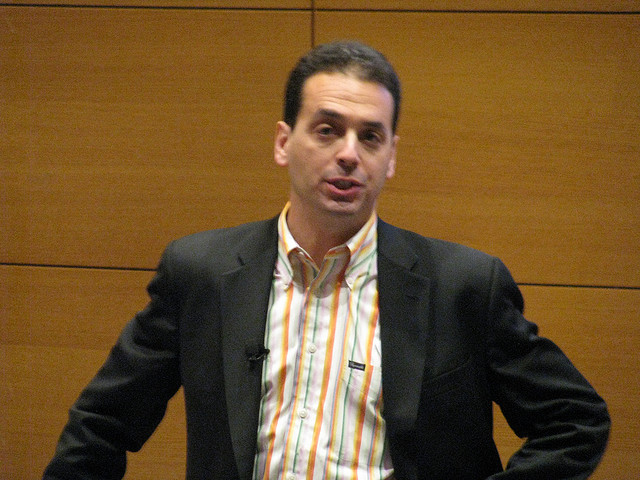
Yesterday, I shared compensation-centric highlights from this week's #HRBookChat Twitter book chat, which featured Daniel Pink; today's follow-up post focuses on Pink's tips to institute a results-only work environment. A ROWE office initiative, as the name indicates, focuses on results rather than a place or a time. Such an environment might include flex time or other malleable working arrangements, but it doesn't require them.
Implementing a ROWE: First Steps
Alyssa Burkus kicked off this portion of the chat by asking for tips to institute a results-only work environment:
Q3: Since we're mainly HR folks, who's working/implemented #ROWE or Type I culture? What's the key to making it work? #HRBookchat
— Alyssa Burkus (@alyssaburkus) January 10, 2012
@YoginiBear -- Keys to making these concepts work for HR folks. Start small and pile up small wins.#HRBookchat
— Daniel Pink (@DanielPink) January 10, 2012
@YoginiBear -- Another key for HR folks: Don't try to change everything in your org. You can't. Instead . . .#HRBookchat
— Daniel Pink (@DanielPink) January 10, 2012
@YoginiBear -- Instead, change 1 thing in your own world. That often catalyzes systemic change. #HRBookchat
— Daniel Pink (@DanielPink) January 10, 2012
This last point has particular importance for those who want to boost their productivity: rather than rolling out wholesale changes to your workflow, start with smaller goals, like cutting down the time you spend on email.
Chris Capozzi asked how to get top executives to support a results-only work environment, which inspired a flurry of ideas:
@DanielPink how do you get top down buy in to this type of culture change?#hrbookchat
— Chris Capozzi (@chriscapozzi) January 10, 2012
@chriscapozzi @DanielPink I gave copies of Drive (secretly) to top executives.
— Anthony Onesto (@anthonyonesto) January 10, 2012
@chriscapozzi this kind of culture change is so indigenous to the human spirit, buy in is more natural than you imagine. #HrBookchat
— David Lapin (@DavidLapin) January 10, 2012
@chriscapozzi -- On getting buy-in from the top. Try something small, then show the results. That's what made ROWE happen.#HRBookchat
— Daniel Pink (@DanielPink) January 10, 2012
Again, Pink's message is to start with baby steps.
ROWE in the Public Sector
What about public sector employees? Pink acknowledged that some businesses will have more trouble instituting a ROWE than others:
I work in a unionized, public sector environment, I think part of the problem would be getting buy-in to #ROWE. #HRBookchat
— Jennifer King (@jenniferaking) January 10, 2012
@jenniferaking-- Motivation 3.0 is more challenging in: a) very large enterprises; b) heavily regulated ones; and . . .#HRBookchat
— Daniel Pink (@DanielPink) January 10, 2012
@jenniferaking- & c) publicly held companies, where the short-term pressures are ferocious. Not sure union status matters much. #HRBookchat
— Daniel Pink (@DanielPink) January 10, 2012
And, a great quote:
I loved the 3M McKnight quote: "Hire good people and leave them alone." #HRBookchat
— Alyssa Burkus (@alyssaburkus) January 10, 2012
Management and Engagement
Another quote-worthy moment comes when Daniel Pink discusses the role of management in engagement.
Another key point: Management is designed to get compliance. But to get engagement, the only thing that works is self-direction. #HRBookchat
— Daniel Pink (@DanielPink) January 10, 2012
@jenniferaking- A lot of this goes to HR's mission. Is it only about laws & compliance or is it also about talent & engagement? #HRbookchat
— Daniel Pink (@DanielPink) January 10, 2012
Trust is important. If you don't trust your employees to contribute after proper training, fit, etc. something is very wrong. #HRBookchat
— Joanne Royce (@JoanneRoyce) January 10, 2012
@JoanneRoyce -- Trust is everything. In the absence of trust, all you get -- at best -- is compliant behavior. #hrbookchat
— Daniel Pink (@DanielPink) January 10, 2012
Employee Fit and Motivation
Sometimes an individual's work style clashes with the preferred working style of his employer. Pink tackles this, too:
Q4: Heard some themes about "top down" and small steps. What can you do if you're an I in an X world? #HRBookchat
— Alyssa Burkus (@alyssaburkus) January 10, 2012
@alyssaburkus A4: Quote from Lead By Greatness: You can only change others by changing yourself! #HrBookchat
— David Lapin (@DavidLapin) January 10, 2012
@alyssaburkus -- If you're an I in an X organization, either find a new org or change 1 thing in your own world. #hrbookchat
— Daniel Pink (@DanielPink) January 10, 2012
Does your office have a results-only work environment? If so, how has it influenced your motivation?







